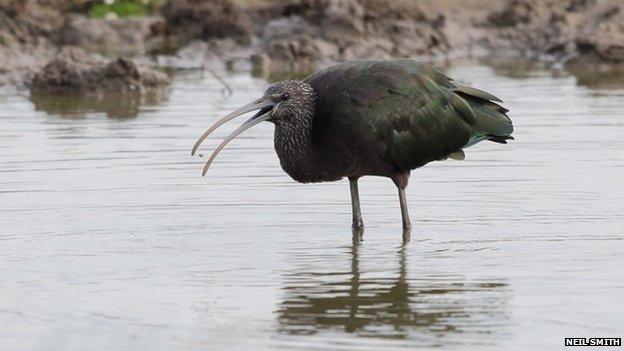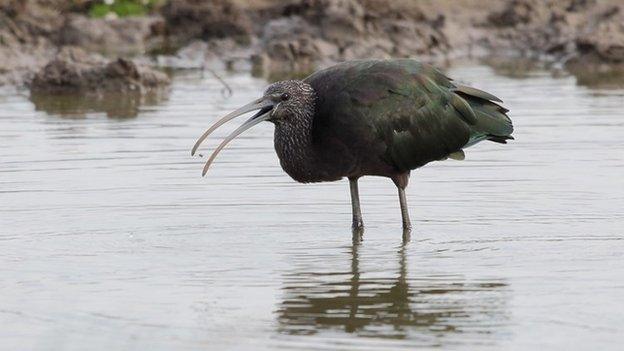Frampton Marsh glossy ibis breeding hopes despite 'tiff'
- Published

Glossy ibis usually nest in the south of France, southern Spain and in south-east Europe
A pair of rare birds spotted building a nest at a nature reserve in Lincolnshire have had a "lovers' tiff", The RSPB has said.
The glossy ibises, which arrived from southern Europe in June, created a nest platform at Frampton Marsh, but did not go on to have chicks.
RSPB officer Chris Andrews said the female had "got bored" with the male and abandoned him.
He said he was hopeful the heron-like birds would reunite in the spring.
Mr Andrews said: "The chap is still with us... they are both quite young birds and she's got bored of him and gone for a wander.
"The male has stayed put but there's a reasonable possibility she'll be back [for the mating season]."
.jpg)
Glossy ibis prefer to live in wetland areas
The female has been spotted in the area but not with as often as the male. Mr Andrews does not think she has migrated.
It is thought the birds flew north earlier this year in search of more favourable nesting sites due to drier conditions, particularly in Spain.
The nesting attempt was believed to be the behaviour of immature birds practising before they are mature enough to breed.
However, Mr Andrews said there is every chance wetland sites like Frampton Marsh, near Boston, will attract more glossy ibises in years to come.
He said that they were only likely to leave if there was a "really harsh" winter and the birds were unable to probe into muddy pools in which they feed.

The glossy ibis
.jpg)
Glossy ibis usually nest in the south of France, southern Spain and in south-east Europe
The glossy ibis gets its name from the iridescent sheen on its wings
These wading birds have long bills and like to feed on small invertebrates in muddy pools
Six glossy ibises were seen on the island of Eigg, one of the small islands south of Skye, in 2012
Some of the birds were also seen at the RSPB Scotland site in Mersehead in October 2010
The Frampton Marsh ibises have been there for more than 150 days

- Published24 August 2014
.jpg)
- Published19 August 2014

- Published18 August 2014
